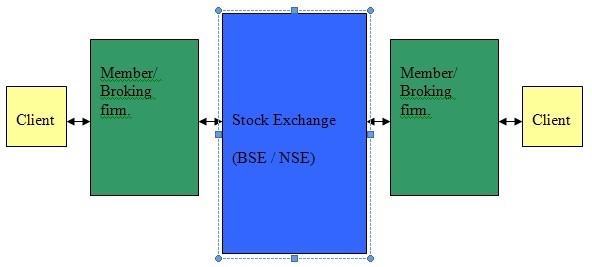Joint stock companies in the private sector issue corporate securities. These include equity shares, preference shares, and debentures. Equity shares have variable dividend and hence belong to the high risk-high return category; preference shares and debentures have fixed returns with lower risk.

Equity shares
By investing in shares, investors basically buy the ownership right to the company. When the company makes profits, shareholders receive their share of the profits in the form of dividends. In addition, when company performs well and the future expectation from the company is very high, the price of the company’s shares goes up in the market. This allows shareholders to sell shares at a profit, leading to capital gains.
Stock Market
In a stock exchange a person who wishes to sell his security is called a seller, and a person who is willing to buy the particular stock is called as the buyer. The rate of stock depends on the simple law of demand and supply. If the demand of shares of company x is greater than its supply then its price of its security increases.
The transaction cycle for purchasing and selling shares online is depicted below:

Preference Shares
Capital stock which provides a specific dividend that is paid before any dividends are paid to common stock holders, and which ownership in a company, although preferred stock shareholders do not enjoy any of the voting rights of common stockholders. Also unlike common stock, preference shares pay a fixed dividend that does not fluctuate, although the company does not have to pay this dividend if it lacks the financial ability to do so. The main benefit to owning preference shares are that the investor has a greater claim on the company's assets than common stockholders. Preferred shareholders always receive their dividends first and, in the event the company goes bankrupt, preferred shareholders are paid off before common stockholders. In general, there are four different types of preferred stock: cumulative preferred, non-cumulative, participating, and convertible. Also called preferred stock.
Bond
A debt instrument issued for a period of more than one year with the purpose of raising capital by borrowing. The Federal government, states, cities, corporations, and many other types of institutions sell bonds. Generally, a bond is a promise to repay the principal along with interest (coupons) on a specified date (maturity). Some bonds do not pay interest, but all bonds require a repayment of principal. When an investor buys a bond, he/she becomes a creditor of the issuer. However, the buyer does not gain any kind of ownership rights to the issuer, unlike in the case of equities. On the hand, a bond holder has a greater claim on an issuer's income than a shareholder in the case of financial distress (this is true for all creditors). Bonds are often divided into different categories based on tax status, credit quality, issuer type, maturity and secured/unsecured (and there are several other ways to classify bonds as well). U.S. Treasury bonds are generally considered the safest unsecured bonds, since the possibility of the Treasury defaulting on payments is almost zero. The yield from a bond is made up of three components: coupon interest, capital gains and interest on interest (if a bond pays no coupon interest, the only yield will be capital gains). A bond might be sold at above or below par (the amount paid out at maturity), but the market price will approach par value as the bond approaches maturity. A riskier bond has to provide a higher payout to compensate for that additional risk. Some bonds are tax-exempt, and these are typically issued by municipal, county or state governments, whose interest payments are not subject to federal income tax, and sometimes also state or local income tax
Warrants
A certificate, usually issued along with a bond or preferred stock, entitling the holder to buy a specific amount of securities at a specific price, usually above the current market price at the time of issuance, for an extended period, anywhere from a few years to forever. In the case that the price of the security rises to above that of the warrant's exercise price, then the investor can buy the security at the warrant's exercise price and resell it for a profit. Otherwise, the warrant will simply expire or remain unused. Warrants are listed on options exchanges and trade independently of the security with which it was issued. Also called subscripttion
A financial instrument whose characteristics and value depend upon the characteristics and value of an underlier, typically a commodity, bond, equity or currency. Examples of derivatives include futures and options. Advanced investors sometimes purchase or sell derivatives to manage the risk associated with the underlying security, to protect against fluctuations in value, or to profit from periods of inactivity or decline. These techniques can be quite complicated and quite risky.


 CAclubindia
CAclubindia
